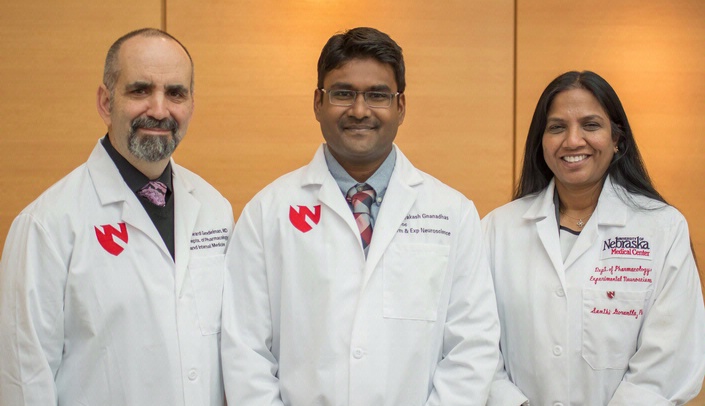A research team at UNMC has used a process they call LASER ART (long-acting slow effective release antiretroviral therapy) to discover an unexpected pathway to open cell storage areas for antiviral drugs. The discovery could revolutionize current treatments for HIV/AIDS by extending the actions of disease-combating medicines.
Support
The research was supported in part by four institutes of the National Institutes of Health — the National Institute on Drug Abuse, the National Institute of Mental Health, the National Institute of Neurological Disorders and Stroke, and the National Institute on Aging.
The drugs were formulated through UNMC’s good laboratory practice (GLP) manufacturing facility. Financial support for the project was provided by Vice Chancellor for Business and Finance Deb Thomas.
The LASER ART research breakthrough is significant, as the invention could be broadly applied. The discovery allows conventional drugs, taken once or twice/day, to be transformed into once a month dosing.
Such changes would ease the burden on patients and their caregivers. The injectable drug bypasses oral absorption and brings the drug to body sites where the virus continues to hide in tissue sanctuaries.
The work is detailed in the March issue of The Journal of Clinical Investigation, one of the world’s leading scientific journals reporting novel, high-impact translational research.
The 14-member research team was spearheaded by three members of the UNMC Department of Pharmacology/Experimental Neuroscience in the College of Medicine — Divya Prakash Gnanadhas, Ph.D., post-doctoral research associate, Santhi Gorantla, Ph.D., associate professor, and Howard Gendelman, M.D., professor and chair. The team also included researchers from the UNMC College of Pharmacy.
Harris Gelbard, M.D., Ph.D., of the University of Rochester Medical Center, discovered the pharmaceutical agent called URMC-099.
“This will likely have a strong global impact on HIV/AIDS health care,” said Dr. Gendelman, whose laboratory has pursued research for more than a decade on LASER ART. “Getting people to take medication every day is difficult. To be able to take medication once a month or even longer will make it much easier for patients to be compliant while at the same time help bring the drug to tissues of the body that are not easily reached by conventional medicines.”
The LASER ART developed by the UNMC scientists is a formulation of injectable drugs, he said. The long-lasting medication was developed by making pharmacological changes in the chemical structure of the drug, while at the same time protecting its abilities to contain infection.
The new drug formulation is not an anti-HIV medicine, Dr. Gorantla said, but rather one that opens storage areas inside cells where drugs can be maintained for a long period of time. This extends the intervals for dosing and allows physicians to administer the drug over an extended period of time.
Prior to this discovery, Dr. Gorantla said only two drugs had been modified in this fashion. Their use was limited, she said, because each injection would require several ounces of drug with larger volumes in each succeeding injection. This amount of drug given can potentially be cut in half with this new medication.

Howie, congratulations to you and your team. A grand start on an extraordinary journey to improve the world's health.
Congratulations !
Dr.Gendelman, Divya and Santhi,
It has been a privilege to work with you and assist and support your team for the past 20 years! This is the whole reason I always wanted to be in Medical Research and make a difference in the world! This makes coming to work exciting! This is such great news! Congratulations and we wish you much more continued success!
Janice and Jimmy (Advanced Microscopy Core Facility)
Good job! Next step developing an endonuclase based anti HIV therapy that can destroy retro viral DNA in infected host cells.
Congratulations!
It is an exciting news! Well done!
An amazing discovery with tremendous potential. Kudos on this latest accomplishment!